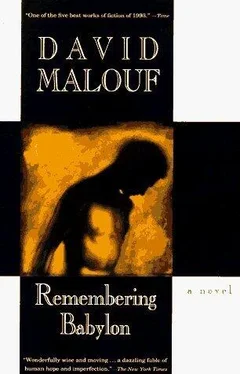They made a place for him. Leona introduced herself, and gave him tea. There was a little cake too, with raisins in it, which crumbled in his hand when he bit into it. He looked up, very self-conscious, to see if it mattered, but it appeared not to, and he added to the scatter of crumbs.
Just the same, he felt awkward. They went back to their lively chatter, which was all half-joking banter that the others seemed practised in and which he did not know how to enter; all its terms were unfamiliar to him. He sat glum and silent and only Gemmy, he thought, amid so much jollity, moved in the same dark strand with him.
But he felt displeased with himself. There was, he saw, some other lighter way of responding to things. These others had found it. What was wrong with him that he could not?
He kept an eye on Hector. He had expected the older boy might be abashed at being caught like this in the company of women, and girls — not to speak of the schoolmaster. He kept waiting for Hector to tip him off, with a wink, that his part in it was a kind of foolery. But Hector was the noisiest among them. Didn’t he know what a clown he was making of himself, with his slick hair and his empty gallantries, or that Leona, to whom they were addressed, made fun of them and was too old for him? He blushed for his friend. Only slowly did it occur to him that some of Hector’s showing off was for his benefit; he was expected to be impressed.
What puzzled him most was the presence of the schoolmaster, who said very little. Was he embarrassed at being discovered here, as Hector might have been and was not? But after a little he saw that Mr Abbot too was included in Leona’s teasing, and did not mind it any more than Hector did, and that Hector’s sallies, in a joking way that suggested an understanding between them, were meant to be measured against what Mr Abbot could produce.
He produced very little. It was Hector who set the pace — Lachlan was astonished, where had he learned all this? — and was the more unconstrained, the more skilled too, at answering Leona back and provoking and pleasing her.
She tried the game, briefly, with him. She had a different tone for each of them, and he thought he detected in the one she chose for him a degree of mockery — for his youth, was it? — that brought a flush of indignation to his cheek. She saw it and drew back, but when he was ignored he took offence. She saw that too, but did not know how to help him.
And Janet?
In these last months they had grown apart. He was already aware of a change in her, but it was now, in this company, that he saw how great it might be. He had taken for granted always that their lives were intertwined, by which he meant that her chief concern must be him. She did nothing to deny it, but was absorbed, he saw, in a world of her own that he had no part in. He caught looks between her and his aunt that had not been there before, and when he burst in upon them once, with his usual expectation of welcome, was surprised by the faces they turned to him, which were attentive but subtly closed.
It had struck him then, and for the first time, that there might be areas of experience that he was not intended to enter. That closed look marked only the closest and most gently guarded of them. Beyond lay others that had never heard of him and never would hear.
He was shaken. In the revelation that a power he had taken for granted in himself might have limitations, he felt much of it fall away.
Meanwhile, here at the table, Janet met his eyes and flushed with embarrassment. Not surely for him!
He found an excuse to get away, though Leona protested. Gemmy went with him, and they walked a little way on the road together. They barely spoke. Gemmy was sick. He too felt sick at heart. He promised to return but knew that he would not, and Gemmy knew it too. They stood a moment, then he turned and moved away.
He looked back once and saw that Gemmy too had turned, about sixty yards off, and they faced one another down the white ribbon of track. They were too far off to be more to one another than figures whose eyes, whose real dimensions even, were lost to distance.
For years afterwards he would have dreams in which he would stand trying, against the fact of distance, to see the look on Gemmy’s face, and once or twice, in his dream, he walked back through the white dust, which rose in ghostly spirals around him, and went right up to where he was standing, and looked into his face. But it remained as blurred as it had been from sixty yards off, and he woke with his cheeks wet, even after so long, though he was no longer a child.
AFTER THREE YEARS in the north, Mr Frazer was delighted with Brisbane. The service at Marr’s Boarding House was cheerful, the jug and basin on the washstand a wonderful guarantee of the amenities, clear water, steaming hot in the mornings, and the soup at the table d’hôte agreeably thick.
The little town was very little, not much more really than a village, and this surprised him considering the almost mystical importance they attached to it ‘up there’, but impressive monuments were in sight. They were shadowy as yet behind scaffolding, but one or two of them had stepped clear and stood broad-fronted and substantial above the verandahed hotels and weatherboard bank buildings and stores, the picket fences, and rutted, rather twisty lanes where, on his morning walk to the top of a wooded ridge, he met barefooted youths driving cows.
The Governor, he soon discovered, was a very visible figure. He dashed about the unpaved streets in a gleaming chariot, wearing epaulettes and a sword, and gave the impression, with his ramrod stance and lean profile, of being the embodiment of a distant, almost unapproachable power. But when Mr Frazer presented himself at Government House, it was Sir George himself who looked out of a window and called him in.
It was as if he had arrived at a rundown country mansion, Palladian in style but with household arrangements that appeared to be Irish, or perhaps the climate had something to do with it; the day was sultry. Toys and flowers with their heads off lay scattered about the entrance hall, which otherwise was very empty — a child’s hobbyhorse, several wooden animals. There were scurryings in side rooms and a woman’s voice raised in complaint.
Sir George came out and seemed irritated by the commotion. Ignoring Mr Frazer and the startled footman, he flung open a door, stood glaring, and the scufflings ceased; but his face, when he turned, remained peevish, and Mr Frazer had the impression, a flash, no more, not of a naval man retired early but of a dignified upper servant who had been caught in his master’s clothes and was convinced, if he was overbearing enough, that he would get away with it. ‘My dear fellow,’ he exclaimed, with sudden affability, ‘do come in. I’m delighted.’
The interview that followed was a puzzle to Mr Frazer. He felt that he had never quite got the hang of it, or of Sir George either.
Sir George, having recovered his poise, appeared a fine, bluff fellow, not so old as you might have thought, and not at all stiff; he invited you to be entirely open with him. But Mr Frazer was disconcerted, just the same, by the line of questioning he took. He had written earlier, no doubt, to Mr Herbert — it was Mr Herbert who had set him on to make this report ? No? Then it was one or other of the people up there (the Governor pushed about a pile of papers he had before him and seemed more and more put out) whom of course he had complete knowledge of — Mr McIntosh, perhaps, one of the O’Hares? It occurred to Mr Frazer after a moment that he was suspected of being an emissary, a secret one, though Sir George had nosed him out, of forces that Sir George was at war with, and who were always, by one means or another, trying to get under his guard. Sir George fixed him with a hurt look, accusatory blue. Am I right sir? Have I found you out?
Читать дальше












